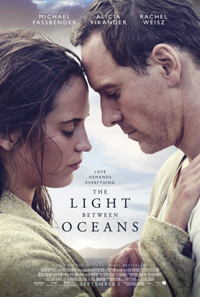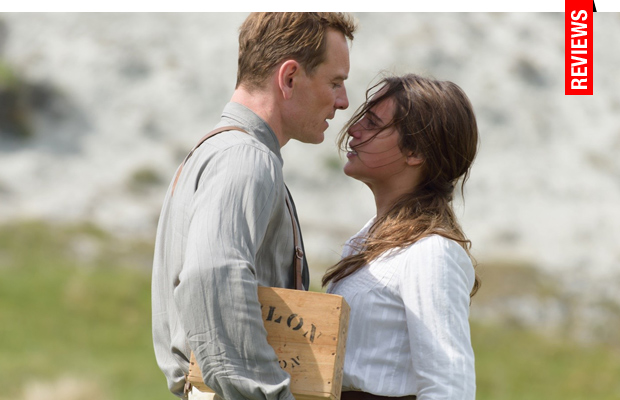Reviews
The Light Between Oceans | Review
To the Lighthouse: Cianfrance Labors Through Melodrama in Handsome Period Piece
 Director Derek Cianfrance manages a series of firsts with his fourth feature, including his first adaptation of a source novel with M.L. Stedman’s The Light Between the Oceans. It’s also his first period piece, set in the early 1920s and concerning the exploits of an emotionally damaged WWI soldier who absconds to the coast of Western Australia to work in a lighthouse, inadvertently falling in love with a young local woman. After they experience a brief honeymoon period, her inability to carry a pregnancy to term proves to be dramatically ruinous—until a miraculous opportunity presents itself. Since it’s Cianfrance at the helm of a period weepie, and this is his first studio project, expectations are high, especially with a narrative poised specifically on such heavy-handed contrivance it could have been underlined with powerful subtexts (you know, perhaps suggesting having a baby isn’t a requirement for making a woman complete, or, since the world is overpopulated, it naturally makes sense not everyone can have children). Unfortunately, it appears the director had little leeway in skewing the source text into something a bit more rational, resulting in a rather solemn, overly serious costume drama which wants desperately to moisten your tear ducts.
Director Derek Cianfrance manages a series of firsts with his fourth feature, including his first adaptation of a source novel with M.L. Stedman’s The Light Between the Oceans. It’s also his first period piece, set in the early 1920s and concerning the exploits of an emotionally damaged WWI soldier who absconds to the coast of Western Australia to work in a lighthouse, inadvertently falling in love with a young local woman. After they experience a brief honeymoon period, her inability to carry a pregnancy to term proves to be dramatically ruinous—until a miraculous opportunity presents itself. Since it’s Cianfrance at the helm of a period weepie, and this is his first studio project, expectations are high, especially with a narrative poised specifically on such heavy-handed contrivance it could have been underlined with powerful subtexts (you know, perhaps suggesting having a baby isn’t a requirement for making a woman complete, or, since the world is overpopulated, it naturally makes sense not everyone can have children). Unfortunately, it appears the director had little leeway in skewing the source text into something a bit more rational, resulting in a rather solemn, overly serious costume drama which wants desperately to moisten your tear ducts.
Tom (Michael Fassbender) is an emotionally paralyzed war veteran who wishes for nothing but to retreat from the world after the atrocities he’s witnessed. Reluctantly, he’s hired on a short contract as a lighthouse keeper on the uninhabited island of Janus Rock (so named for the craggy faced Roman god who looks into the past and future simultaneously—he’s referenced directly, so don’t forget about him). Usually, men without families aren’t found to be acceptable for such a position because they go stir crazy, but a suicide attempt from his predecessor hastens the decision. Tom isn’t alone for long, as a comely young woman on the mainland, Isabel (Alicia Vikander), aggressively pursues him, and before long they’re married following a courtship of flurried love letters. But after a brief period of bliss, Isabel suffers not one, but two miscarriages. Devastated, she’s hardly had time to mourn her second child when a boat washes close to shore carrying a dead man and a baby girl. Convincing Tom to bury the man and pretend the baby is theirs brings momentary respite. However, after several years, Tom learns about a local woman, the wealthy Hannah Roennfeldt (Rachel Weisz), who lost her German immigrant husband and their infant at sea when he was chased by the crazed, xenophobic locals. Wishing to hand the child over once he’s privy to this information, Tom is thwarted by Isabel, who has no designs on ever letting her daughter go.
Cianfrance’s predilection for tempestuous romantic relationships gets a finely feathered nest in this handsome production, which is also his first film not to headline Ryan Gosling (who previously starred in the agonizing Blue Valentine and intergenerational neo-noir class drama The Place Beyond the Pines). Production design is to the title’s benefit, with DP Adam Arkapaw (favored cinematographer of Justin Kurzel) conveying a drastic juxtaposition between impressive exteriors and the sterile, barren insides of the lighthouse, perhaps meant to invoke the faded days of the period as well as a metaphor for Isabel (whose maiden, Graysmark, also connotes a certain shadowy foreboding).
Comparatively, Weisz’s Hannah is customarily visualized amidst markers of her wealth, her home surrounded by lush, fertile foliage. Between them is a rather doltish Michael Fassbender, who is a particularly steadfast presence doing his best to channel Burt Lancaster, but his relationships with both women (a romantic inclination for Vikander, a guilt stricken one for Weisz) are never quite believable. Instead, it’s as if The Light Between Oceans is dying to morph into some kind of hyper dramatic women’s picture from the studio era of the late 40s (just fantasize on an anxious Bette Davis stealing away her changeling baby from a mournful Joan Crawford under the direction of George Cukor).
Both women do get shining moments, particularly Vikander, whose reenactment of a miscarriage is quite grueling, but their situation is eventually hampered by honorable schmaltz, in the melodramatic vein of Losing Isiah (1994) but with the luridness and unbelievable convenience of something a bit more Euro flavored, like Safy Nebbou’s Mark of an Angel (2008), itself which actually hails from the headlines.
While The Light Between Oceans isn’t able to command the unflinching attention of his previous two films, it is a masterfully controlled, highly professional concoction from Cianfrance—if only we were moved to feel something for its two principals (which would have assisted all the third act emotional manipulations balanced awkwardly on Vikander’s character having to make a decision the film itself has formulated as a no brainer) perhaps this would have registered as a bit more meaningful.
★★★/☆☆☆☆☆
Los Angeles based Nicholas Bell is IONCINEMA.com's Chief Film Critic and covers film festivals such as Sundance, Berlin, Cannes and TIFF. He is part of the critic groups on Rotten Tomatoes, The Los Angeles Film Critics Association (LAFCA), the Online Film Critics Society (OFCS) and GALECA. His top 3 for 2021: France (Bruno Dumont), Passing (Rebecca Hall) and Nightmare Alley (Guillermo Del Toro). He was a jury member at the 2019 Cleveland International Film Festival.






























